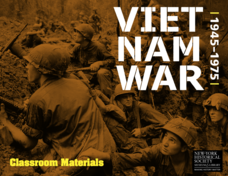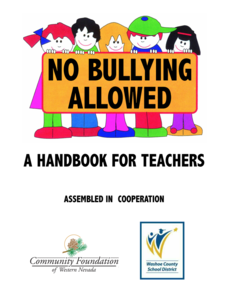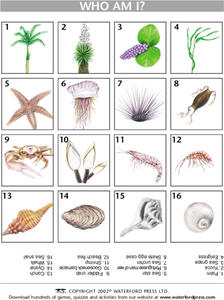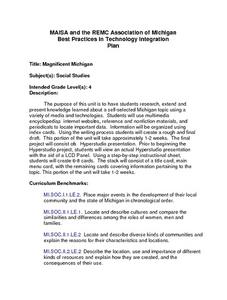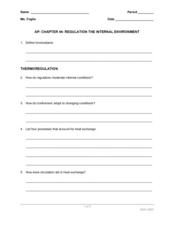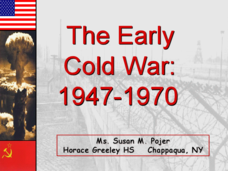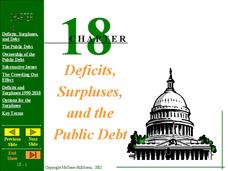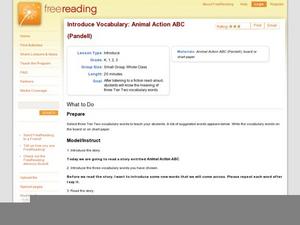Houghton Mifflin Harcourt
Nature: Friend and Foe: Extra Support Lessons (Theme 6)
Breaking down words into syllables has two benefits: it improves vocabulary and it improves understanding of a text. The third and final resource in a series of materials designed to be used with Nature: Friend or Foe offers extra...
New York Historical Society
The Vietnam War: 1945-1975
Do pupils know that the Vietnam War spanned a period of 30 years? A war that long is bound to leave devastating effects. Help young historians develop a comprehensive understanding of the war through multiple units on the subject that...
Community Foundation of Western Nevada
No Bullying Allowed
Through discussion, role play, read-alouds, writing, and more, scholars explore the concept of bullying and practice having courage while responsibly reporting unfriendly behavior. Friendship and respect are practiced and encouraged. ...
PBS
Stereotypes vs. Statistics (Grades 9-12)
What is a common stereotype people may think about you; is it true? Using a thought-provoking lesson, high schoolers analyze common stereotypes of the Latino-American population versus statistical data. Scholars review data and have the...
PBS
The Symbolism of Castle's Bedroom in Ghost
To conclude a unit study of Jason Reynold's Ghost, class members examine how Castle's feeling about his bedroom change over the course of the novel. Groups use the provided graphic organizer to identify the plot of the novel and then use...
Texas Education Agency (TEA)
Archetypes, Motifs, and Plot in Drama (English II Reading)
The second interactive in a series of 10 introduces young scholars to character archetypes, archetypal plot patterns, and archetypal motifs, including the use of color. Learners read passages explaining the term and study examples from...
Curated OER
Who am I?
This resource allows young botanists to see plants, sea life, and more. They must find the name of the organism and paste it underneath the picture. The pictures are especially colorful. This would be a great worksheet for...
Curated OER
Sand Shakes & Mud Pies: Investigating Sediment
Take a field trip to a location where water and land meet to study patterns of sediment organization in wet habitats: river or ocean beaches, sand dunes, tidal marshes, the edge of a pond, or a woodland stream. Small groups collect pairs...
Curated OER
Where's Dinner?
Upcoming marine biologists consider a list of organisms residing near the Lost City hydrothermal vents and construct a food web. They compare the food web to that of a cold seep community, of which they should have previous knowledge....
Curated OER
Magnificent Michigan
Fourth graders complete a research project about the state of Michigan. They conduct Internet research, organize the information on index cards, and create a HyperStudio presentation.
Curated OER
Character Analysis Chart
This versatile graphic organizer could be used alongside any novel, poem, play, or story through which your class in studying character. Class members can get characters straight or describe particular characters in more detail with this...
Curated OER
Lincoln, Emancipation, and the Constitution
High schoolers determine how President Lincoln promoted emancipation. In this slavery lesson, students examine primary documents, including the U.S. Constitution, to reconstruct Lincoln's attempts to end slavery and deliver the...
Curated OER
Go Free or Die
Groups of older elementary learners begin their study of figurative language by visiting a website and completing the exercises detailed there. They then apply what they have learned by finding examples in several poems. Finally, they...
Curated OER
AP: Chapter 44: Regulation of the Internal Environment
When nature calls, you need to answer. Physiology learners discover that it is a just your body's way of regulating pressure and water content. Along with osmoregulation, they also examine thermoregulation, two vital processes with which...
Curated OER
viruses
No title page for this presentation about single-celled processes and gene recombination means that your class would jump into a set of slides full of relevant and detailed information. There are many labelled images and diagrams, which...
Curated OER
19c European Liberalism
If you'd like to prompt some great discussions in your history class, this presentation will surely get your class talking. Addressing 19th century liberalism in Europe (including influences from England, France, America, and Ireland),...
Curated OER
The Early Cold War: 1947-1970
With a combination of images, maps, and valuable information, this presentation is a strong resource for a history class that is coming out of a WWII unit and into a Cold War unit. Some points are outlined for students, while others are...
Curated OER
Chapter 18: Deficits, Surpluses, and the Public Debt
Sobering, informative, and relevant for today, this presentation is sure to fill in some of the gaps between the current financial crisis and the theories of economics. With explanatory graphs and strong discussion points, these slides...
Curated OER
Today's World
While not an exhaustive review of globalization and trade, this overview of the inter-related nature of the economy would be a good tool to use in the classroom. This resource could be used to begin a discussion on the various topics...
Curated OER
Roman Republic
Experience the birth and rise of the Roman Empire with these slides, which include explanatory maps and pictures. Details of the Roman government draw an easy parallel to the American government, which could start an engaging discussion.
Curated OER
World Oil Reserves: Assignment
Understanding and analyzing data is a critical skill. Included here are three worksheets a list of countries with the largest oil reserves, a graph of the same, and an assignment. The class uses their data to create a bar chart then...
Curated OER
Introduce Vocabulary: An Earthworm's Life (Himmelman)
Explore some tier-two vocabulary using John Himmelman's informational text An Earthworm's Life. Recommended words for this slimy text are: bulge, burrow, journey, soil, and underground. After introducing these words, help kids utilize...
Curated OER
Introduce Vocabulary: Animal Action ABC (Pandell)
Get your kinesthetic learners engaged in a vocabulary study using Karen Pandell's book, Animal Action ABC. They move around as you read, and raise their hands whenever they hear one of the words you are learning. Pre-teach the terms:...
Curated OER
Introduce Vocabulary: Doctor DeSoto (Steig)
William Steig's story of a witty mouse couple will have scholars intrigued as they listen for new vocabulary words and context clues. Doctor DeSoto can be found on YouTube in case you don't have it. Emerging readers expand their...
Other popular searches
- "Organizational Skills" Study
- Study Organization Skills
- Organizational Skills Study
- Organization and Study Skills



